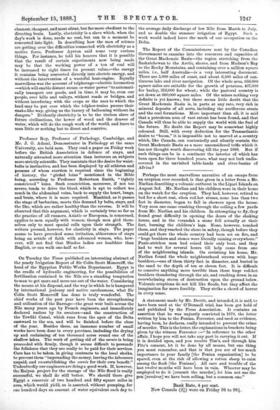On Tuesday the Times published an interesting abstract of the
yearly Irrigation Report of Sir Colin Scott Moncreiff, the head of the Egyptian Public Works Department. Egypt is the cradle of hydraulic engineering, for the possibilities of fertilisation contained in the Nile are a standing temptation to man to get more and more use out of the water. Considering the means at his disposal, and the way in which he is hampered by international jealousy and native carelessness, what Sir Colin Scott Moncreiff has done is truly wonderful. The chief works of the past year have been the strengthening and utilisation of the Barrage—the great weir built across the Nile many years ago by French engineers, and immediately declared useless by its creators—and the construction of the Tewfiki Canal, which runs from the apex of the Delta eastward to the sea, and will be finished before the close of the year. Besides these, an immense number of small works have been done in every province, including the drying up and reclaiming of ten thousand acres round one of the shallow lakes. The work of getting rid of the cornee is being proceeded with firmly, though it seems difficult to persuade the fellaheen that they are really to be paid for their services. Care has to be taken, in giving contracts to the local sheiks, to prevent them "impounding the money, leaving the labourers unpaid, and re-establishing the corvee for their own benefit." Undoubtedly our engineers are doing a good work. If, however, the Raiyan project for the storage of the Nile flood is really successful, we shall do still better. We should there give Egypt a reservoir of two hundred and fifty square miles in area, which would yield, as is asserted, without pumping, for one hundred days an amount of water equivalent each day to
the average daily discharge of low Nile from March to July, and so doable the summer irrigation of Egypt. Such a work would indeed leave the mark of our occupation on the Delta.


































 Previous page
Previous page